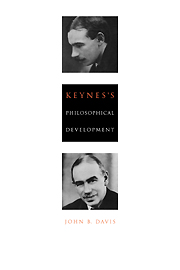Book contents
- Frontmatter
- Contents
- Preface
- Introduction: Keynes and philosophy
- 1 Keynes's early intuitionism
- 2 The dilemmas of Moore's Principia for ethics and economics
- 3 Keynes's self-critique
- 4 Keynes's later philosophy
- 5 The philosophical thinking of The General Theory
- 6 Ethics and policy
- Conclusion: Keynes's philosophical development
- Notes
- References
- Index
Introduction: Keynes and philosophy
Published online by Cambridge University Press: 28 August 2009
- Frontmatter
- Contents
- Preface
- Introduction: Keynes and philosophy
- 1 Keynes's early intuitionism
- 2 The dilemmas of Moore's Principia for ethics and economics
- 3 Keynes's self-critique
- 4 Keynes's later philosophy
- 5 The philosophical thinking of The General Theory
- 6 Ethics and policy
- Conclusion: Keynes's philosophical development
- Notes
- References
- Index
Summary
Explanation of John Maynard Keynes's philosophical thinking raises serious problems of interpretation, the neglect of which threatens to jeopardize the entire enterprise of understanding Keynes's overall thought. One important problem derives from the fact that Keynes's philosophical and economic work occurred at different stages of his intellectual career. After an early preoccupation with philosophy, when Keynes thought that his important scholarly contributions were likely to be made in extending the philosophy of logic beyond the foundations only recently laid in Bertrand Russell and Alfred North Whitehead's Principia Mathematica, Keynes turned almost exclusively to the study of economics, and seemed to lose interest in or at least the time for serious work in philosophy. Indeed after the beginning of the First World War, by which time his Treatise on Probability was largely complete, he never again attempted to produce the sort of systematic and complete discussion of philosophical ideas he had achieved in his undergraduate and postgraduate years at Cambridge. The result is that philosophical ideas are either altogether absent from the language and thought of Keynes's economics, which adopts from the beginning the categories and modes of reasoning of Alfred Marshall, or such philosophical themes as do appear in Keynes's economics are at such a significant remove from the contexts in which they originally functioned at Cambridge that we must wonder whether their meanings and roles have been subtly changed by their re-location to economics.
- Type
- Chapter
- Information
- Keynes's Philosophical Development , pp. 1 - 8Publisher: Cambridge University PressPrint publication year: 1994



